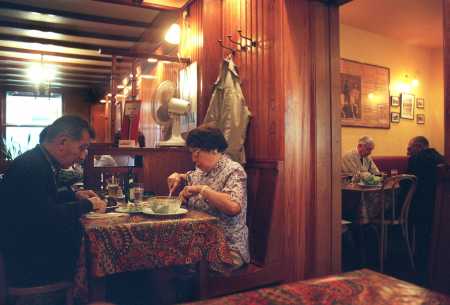|
Associated Press, June 13, 1999
Dioxin scare? Belgians move on to horse, eel, even buffalo
By RAF CASERT Associated Press Writer VILVOORDE, Belgium (AP) - Belgians will not be kept from a decent meal, dangerous food contamination or not. Roast chicken and mayonnaise might have been laced with dioxin, but there are always recipes for unlikely alternatives: horse, eel, buffalo. So while the world was recoiling in horror from evidence that Belgian poultry, pork, beef, eggs and dairy products were contaminated with cancer-causing dioxin, the De Kuiper horsemeat restaurant was hopping. "The phone is ringing off the hook," said owner Alfons Gulickx. "We cannot even take reservations. As soon as a table is free, it's taken." On weekends, the wait for a table is over an hour. The restaurant in Vilvoorde, an industrial town close to Brussels, specializes in lean, sweet horse steaks and has been popular for decades. But nothing could prepare Gulickx for the past two weeks, when the dioxin scandal made everything from chicken to beef too suspect to eat. Denied their traditional fare, people asked Gulickx to sell horsemeat over the counter. "I cannot even get meat for myself," he said. He had to fly in fresh supplies from Canada. Horsemeat sales have increased by half, but Gulickx is no happy man. "Things are going great for all the wrong reasons. My children also ate this stuff," he said, referring to the dioxin-laced food. The chemical is suspected of having spread from tainted animal feed into all the animals that ate it - and all the products made with those animals. Exports have been particularly damaged by the scare. From Malaysia to New York, Belgium's gastronomic reputation has taken a nosedive, with such classics as Belgian waffles and chocolates often out of reach of international gourmets. The Belgian government has argued in vain that the dioxin contamination could be traced to one incident that was already fully under control. "It's a national catastrophe," said Myriam Wittamer, administrator of the famed Wittamer pastry and chocolate house. "I don't know we'll be able to restore our international image. I'm not proud to be Belgian." Because of the freshness of its pastries, Wittamer does not rely much on exports so damage from the crisis has been limited. The company is now getting butter from France and eggs from Germany. One client in the Middle East had to take Wittamer chocolates off the shelves, and the only foreign pastry order that was canceled came from someone "in the international high financial circles," Wittamer said, without elaborating. As for herself, "I don't care. I still eat my pastries in the morning." For two weeks, Belgium issued bans designed to make it impossible to use local products in such favored delicacies as chocolate mousse or asparagus "a la Flamande." However, many Belgians, including the prime minister's wife, tend to assume rules don't apply to them. Celie Dehaene, wife of Prime Minister Jean-Luc Dehaene, readily admitted she took no precautions with the family food. "Last weekend we had a barbecue here, with Belgian chicken," she said. Poultry was on the banned list at the time. "We just eat everything, and so do the kids," she told the Brussels newspaper La Derniere Heure. Critics say such a laissez-faire attitude has turned Belgium, the country with the densest concentration of restaurants in the Michelin guidebook, into a culinary pariah. The government admitted that the Belgian food chain was woefully short of controls. Geert Van Hecke, the chef of the three-Michelin star De Karmeliet restaurant in Bruges, agreed. "The quality of Belgian ingredients is not that good. You never know where it is coming from," he said. He gets his poultry and veal from France. During the crisis, Belgians flocked to organic food stores and tried all sorts of exotic substitutes. In the southern Ardennes hills, where a herd of buffalo roams, rancher Jean-Francois d'Hoffschmidt suddenly doesn't have enough of the meat to go round. "The meat may be more expensive," he said, "but people keep asking now because they know it is natural."
|
||||
